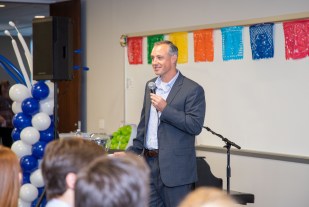
Williams has long been a supporter of United Way and its mission to bring people and organizations together to drive lasting change around the country and the world. Last year, Williams and its employees, retirees and board members supported more than 160 local area United Way agencies, pledging more than $4.2 million.
Williams leader Scott Hallam doesn’t just believe in giving to United Way. As this year’s chair of the United Way of Greater Houston’s annual community campaign, he’s actively sharing the impact of United Way’s work in the community.
Learn more in this Q&A with Hallam, our senior vice president for Transmission and Gulf of Mexico Operating Area.
Why did you accept the role as campaign chair for the greater Houston campaign?
First, the role felt enormous and beyond my comfort zone. I was raised to say yes when those two feelings combine. Second, I wanted to be a part of innovating and adapting the community campaign to change lives and make a difference for our neighbors and communities. I’ve seen firsthand the impact United Way of Greater Houston has on our community in helping families and individuals attain a sustainable quality of living.
You are also on the organization’s Board of Trustees. Why have you long supported the mission of United Way?
The Houston community is vast and diverse, and this is a great opportunity to engage and serve our neighbors and communities. United Way is here to create opportunities for those who are working hard, sometimes two or three jobs, those who are working to build a better future for their kids and families, those who are stuck in an endless cycle of living near poverty and never finding financial stability. United Way helps people break down the barriers that keep them in a state of struggle and prevent them from becoming financially stable.
What are the greatest needs in the community and how do United Way agencies work to meet them?
Nearly half of the families in our area struggle to pay for basic necessities, let alone save for the future or an unexpected expense. The families often have to make impossible choices, such as deciding whether to buy food, pay for health care or pay rent.
Just last year, 1.2 million people called the 2-1-1 helpline for rental assistance, health care, insurance, food and transportation, just to name a few. Additionally, nearly 50,000 people have been helped on a pathway to financial stability, such as financial education and coaching, home purchasing assistance, tax return assistance and workforce development services.
